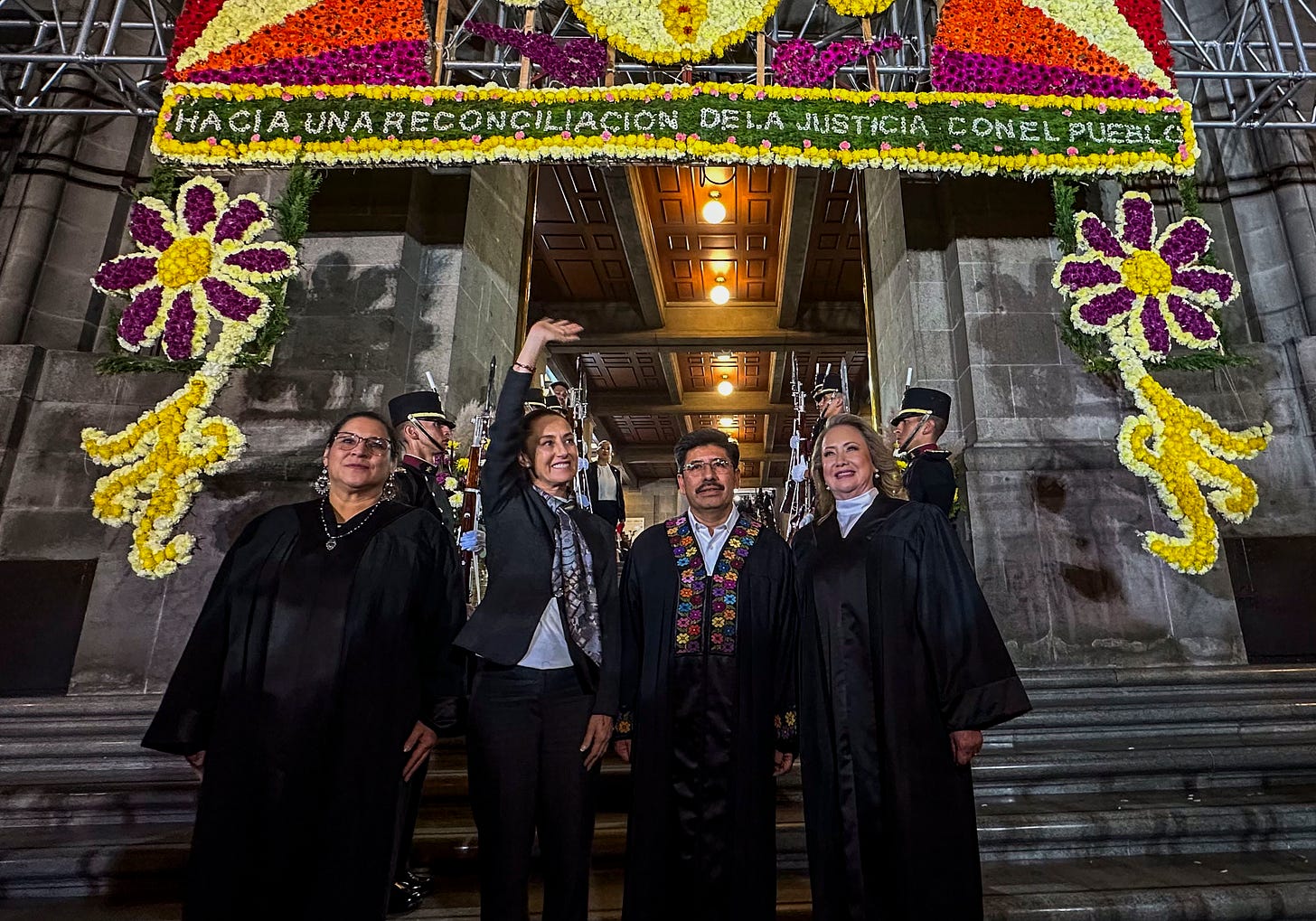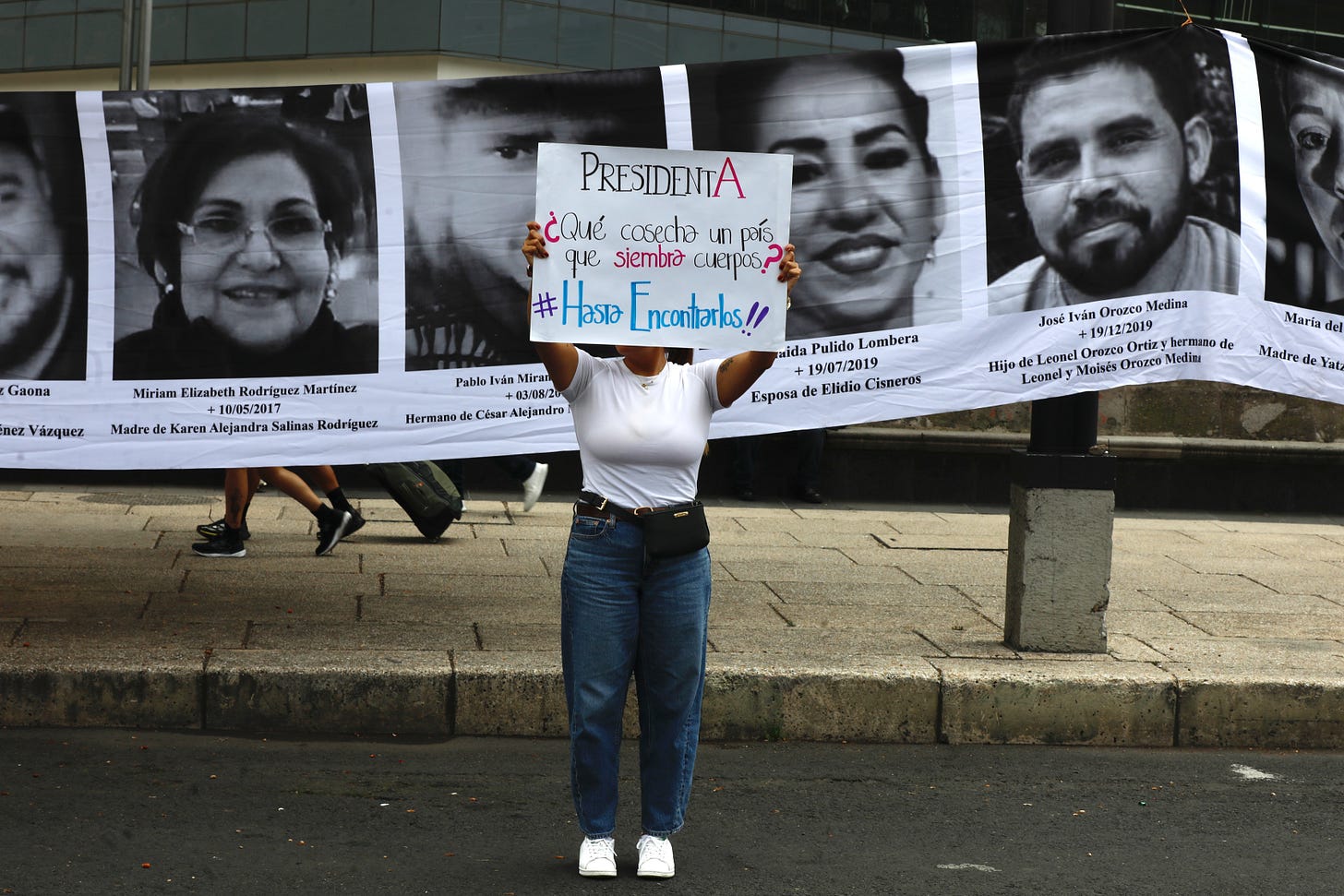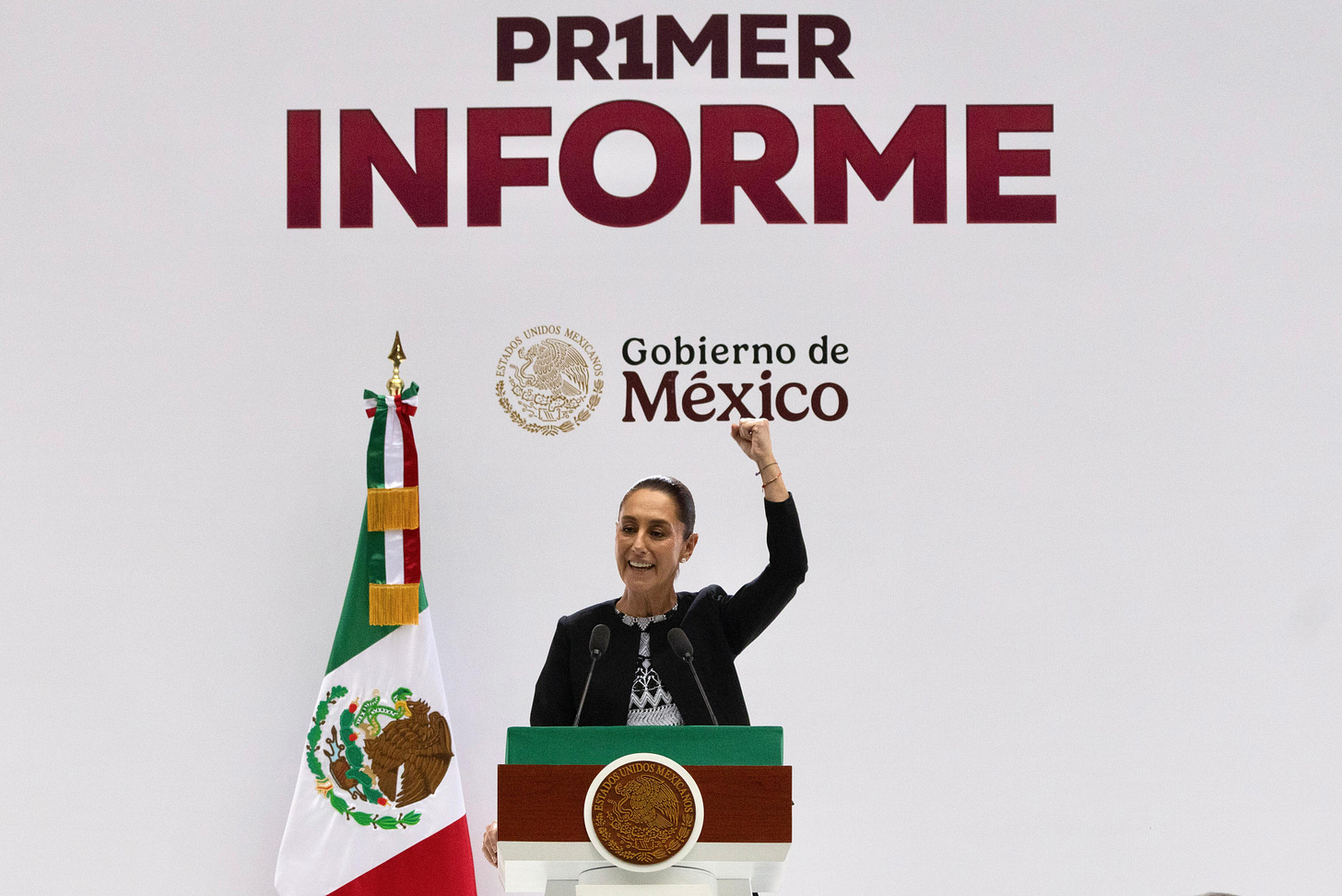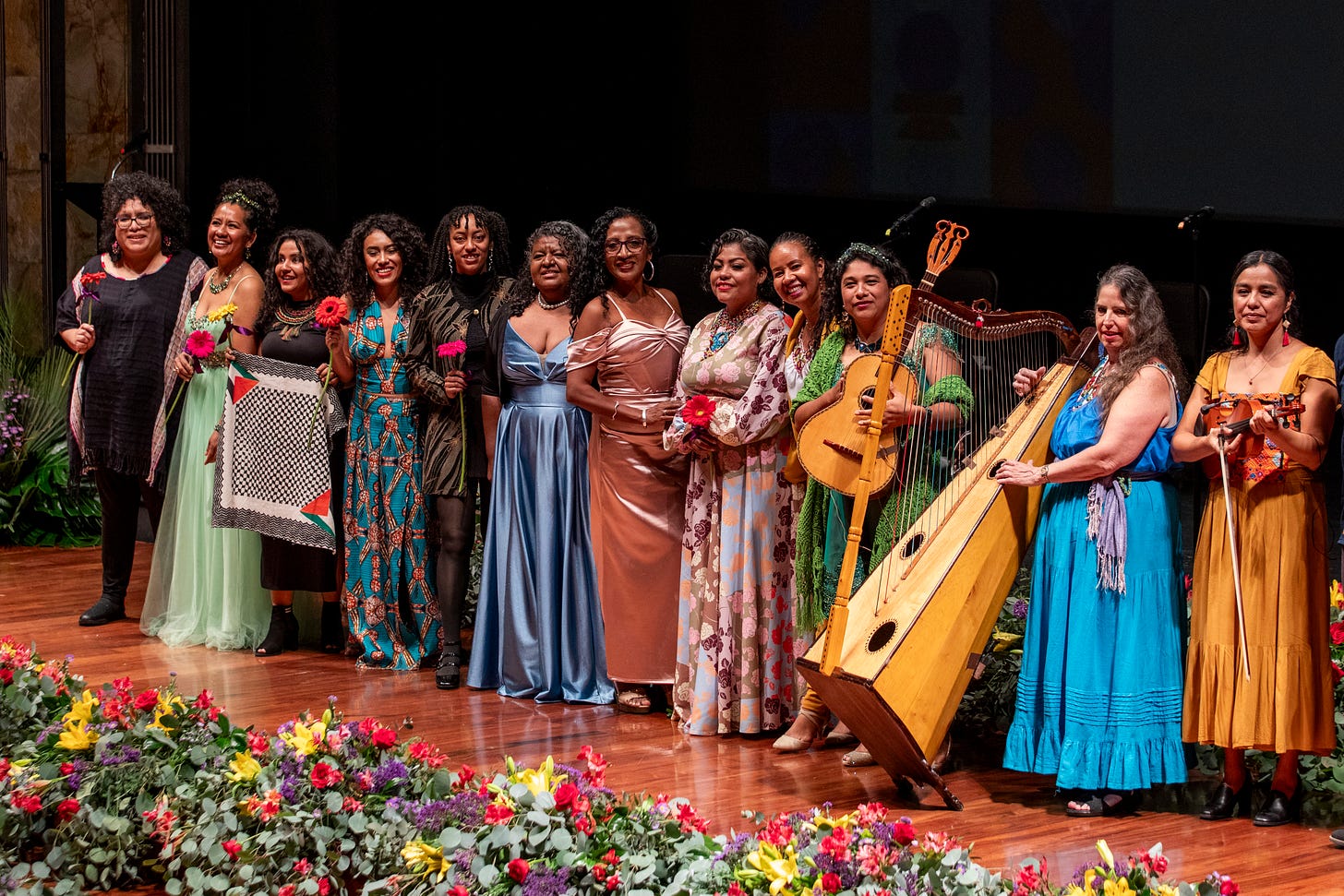A Preliminary Assessment of Mexico’s Fourth Transformation
Also in this edition: A flotilla heads toward Gaza. Forced disappearances transcend presidential terms. The U.S. steps up pressure on Venezuela. Leonora Carrington—her defiance and resilience.
Lea La Jornada Internacional en español aquí.
The end of the dark neoliberal night—but dawn has yet to come for everyone.

In her report to the nation on September 1, Mexico’s first female president, Claudia Sheinbaum Pardo, declared that “the dark night of neoliberalism is behind us.” She emphasized that through the new project of social justice known as the Fourth Transformation—launched seven years ago by Andrés Manuel López Obrador and now being deepened during her administration —“not only was political power separated from economic power, but... more than 13.5 million people were lifted out of poverty.” She highlighted that “from 2018 to 2024, the poverty rate dropped from 41.9 percent of the population to 29.5 percent, the lowest level in at least 40 years.”
Eleven months after taking office at the National Palace, Sheinbaum stressed that “we're doing well, and we’re going to do even better,” offering a list of achievements and upcoming steps in what she called “the most ambitious social plan in Mexico’s history”—a claim that historians will now have to debate. The plan includes direct assistance to the poor and most vulnerable, as well as investments in public healthcare, education, and more. In 2025, spending on social welfare programs will equal 2.3 percent of GDP.
Sheinbaum also addressed public investment in infrastructure and economic development across energy, transportation, and tourism sectors. She added that “in Mexico, there is no repression, the force of the state is not used against the people, we have the greatest freedom of expression in our history, there is no censorship, and all authorities are elected by the people.”
The speech reflected, according to La Jornada, that “for the first time in decades, Mexico has a true national project—one that may not please certain groups and may have flaws in its design or execution, but is clearly distinct from the business packages for elites that were passed off as national projects during the neoliberal period.” This inclusive proposal, it adds, “can be considered the main factor explaining the unprecedented approval levels… Eight out of 10 citizens support it— true unity around a shared project.”
The historical context of this proclaimed end to neoliberalism is summarized by columnist Carlos Fernández Vega, who contrasts a wealth-concentrating model—where costs are socialized and profits privatized—with a new one focused on redistribution and an active government role in the country’s socioeconomic development.
Yet, despite the optimism and promises, the report was delivered in a country facing urgent challenges and unresolved problems. Despite historic progress against poverty, around 45.83 million Mexicans—35.1 percent of the population—still do not earn enough to afford a basic food basket, a rate that has remained steady in recent years. Meanwhile, although the formal sector lost jobs, informal labor increased, boosting overall employment. In fact, 54.8 percent of the workforce is in the informal sector, a figure higher than last year.
Teachers continue to demand the repeal of the education reform and a fair retirement plan. In rural areas, while welfare has improved, serious issues persist—droughts, falling prices for staple grains, lack of financing, and more, according to the Agricultural Markets Consulting Group.
Social, human rights, and environmental organizations have also voiced criticisms over the lack of real progress on issues like forced disappearances, including the case of the 43 missing Ayotzinapa students, public safety, and the absence of broader initiatives to address environmental destruction in various regions of Mexico.
According to journalist Julio Hernández López, the ritual and message of the speech portrayed a president who, on one hand, highlighted achievements and the significance of judicial reform, especially regarding the attention promised to Indigenous peoples and the most vulnerable (with Hugo Aguilar seen as an early sketch of a justice-driven hero). On the other hand, she called for a more active and committed business sector aligned with “Plan Mexico” (which, it is implied, belongs not to the neoliberal night, but to the dawn of a new day).

The Quote:
I’m not afraid of artificial intelligence. I’m afraid of natural stupidity, which is far more abundant.
-Guillermo del Toro, presenting Frankenstein at the Venice Film Festival. ▶️ VIDEO
In Case You Missed It
◻️ Breaking the blockade on Gaza. A flotilla is sailing toward Gaza in an attempt to break Israel’s siege. Among those on board are six Mexicans, activist Greta Thunberg, and actors Eduard Fernández, Liam Cunningham, and Susan Sarandon, and more are expected to join. A broad international group of cultural figures, from Pedro Almodóvar to Mark Ruffalo, along with athletes, have expressed solidarity with the Palestinian people and condemnation of what is being called a genocide by the Israeli government. As part of our ongoing coverage, we are publishing updates on the flotilla, reports from Gaza, and opinion pieces. Visit our site for the latest.
◻️ The cases of forced disappearances "transcend administrations." On the International Day of the Victims of Enforced Disappearances, families denounced that the crisis has persisted through multiple governments, and that there is still a lack of political will. During a day of protest in the capital and at least 10 states, the families demanded, “We want them alive!” Search groups warned of the dangers they face in states like Veracruz. The Deputy Representative of the UN Office for Human Rights in Mexico said that while the country has made “significant steps” in law, institutions, and court rulings, there is still a need to strengthen search and justice capabilities. Mexico City’s Human Rights Commission also noted structural failures within the city’s prosecutor’s office.

◻️ A new era for the judiciary begins. With symbols from ancestral ceremonies and the massive presence of Indigenous communities in the heart of Mexico City, the 12th era of the Supreme Court began with Indigenous judge Hugo Aguilar Ortiz as its president. This ceremony marked the inauguration of the highest judicial body in Mexico, which for the first time in history, was elected by the people. Its headquarters stands on the site where, in 1560, Moctezuma II’s house stood and where the ritual of Los Voladores took place. Despite criticism, the real test of this judicial reform, which culminated in the election of new judges, will be in its future rulings.
◻️ U.S. intensifies pressure on Venezuela. A U.S. naval fleet sent to the southern Caribbean to intimidate Caracas attacked a boat purportedly involved in drug trafficking, killing all 11 people on board. Venezuelan President Nicolás Maduro blamed U.S. Secretary of State Marco Rubio for the hostile environment, declaring, “They’re coming for Venezuela’s oil and gas—they want it for free.” La Jornada calls for an independent investigation of the attack, noting that “11 people were massacred… without even attempting to capture and present them before a court, which is what rule of law requires: criminals are to be arrested and tried, not executed in cold blood.”
◻️ Together, Mexico and Brazil account for 70% of Latin American exports. Brazil’s Vice President led a mission to Mexico alongside 150 business leaders who committed to negotiating new trade and investment agreements. “Cooperation between the two economic and demographic giants of the region could inspire other Latin American nations to follow suit,” La Jornada editorializes.
◻️ Afro-Mexican literary gathering. “Mexico is also Black. I was never enslaved, I’m still standing, fighting for our rights.” With these verses, Patricia Guadalupe Ramírez Bazán, from the Costa Chica of Guerrero, opened the first National Meeting of Black and Afro-Mexican Women Writers.
◻️ 20 Years since Hurricane Katrina. The main cause of the worst natural disaster in U.S. history wasn’t nature, but rather politics. Officials failed to act despite knowing that the levee system was inadequate and that urban “development” was eroding the natural barriers protecting New Orleans and the Gulf Coast. At the time, Naomi Klein described the reconstruction effort as more of an “ethnic cleansing” for private capital than a relief program for residents. Two decades later, recovery for most of the city remains tied to tourism and privatization, while President Donald Trump continues dismantling the federal agencies responsible for disaster preparedness, inviting another Katrina.
◻️ Leonora Carrington: her defiance and resilience. A new film about the surrealist artist, based on a novel by Elena Poniatowska, hits theaters this month. “I believe that without Mexico, Leonora wouldn’t be the artist we know today,” director Thor Klein told La Jornada.





